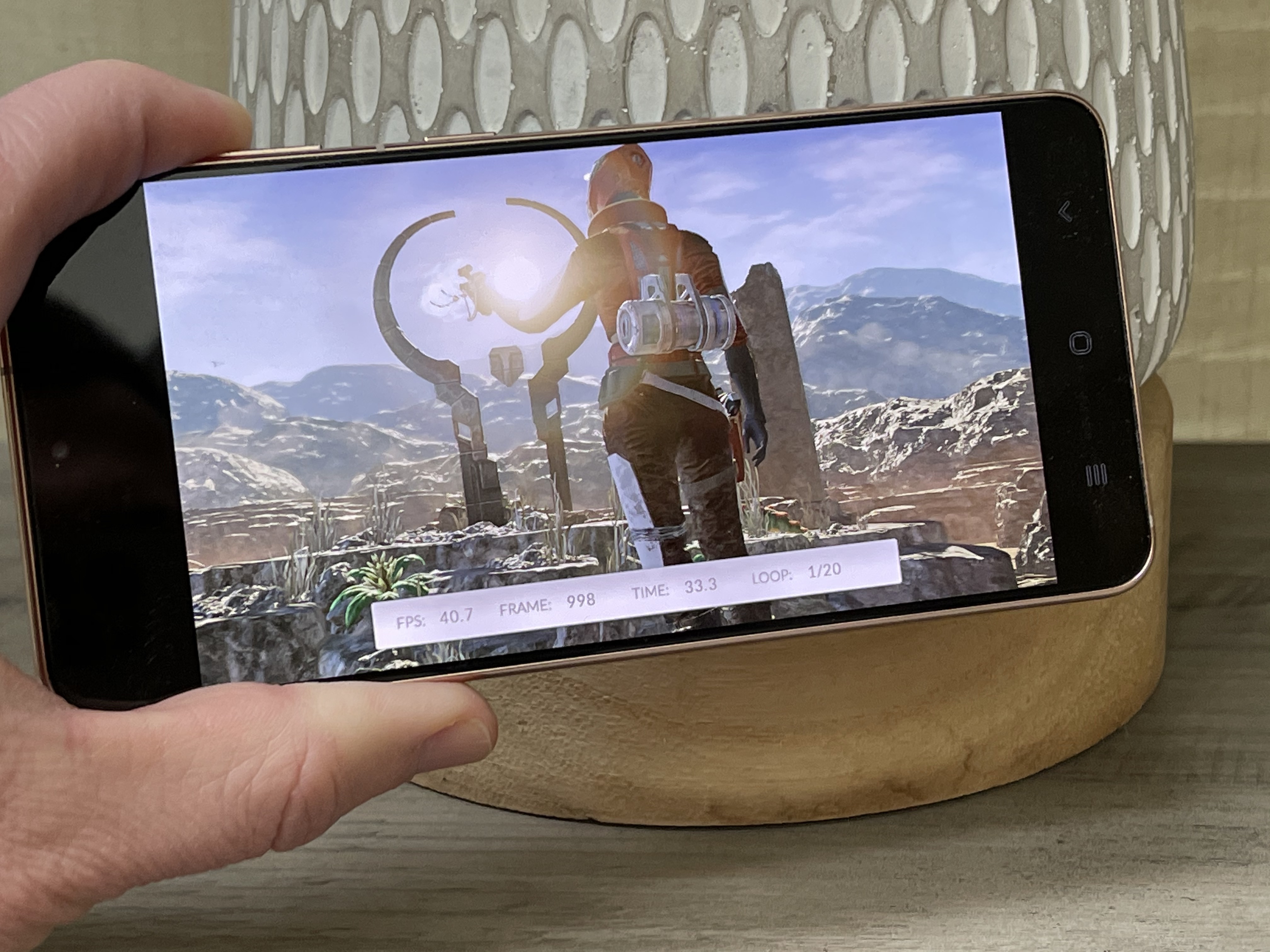Samsung Galaxy S21 benchmarks: Faster but still no match for iPhone 12
The Galaxy S21 is the fastest Android phone we've tested, but the iPhone 12 still outperforms it

The Snapdragon 888 inside the new Samsung Galaxy S21 is certainly a fast mobile processing platform — easily the fastest to power an Android device up until now. But after putting two of Samsung's phones through a battery of tests, we've learned that Apple and its A14 Bionic-powered iPhone 12 lineup has nothing to fear from this year's crop of Android phones.
We conducted our benchmark tests for our Galaxy S21 and Galaxy S21 Ultra reviews and found both to be much more powerful than any Android device that's come before. More importantly, the Galaxy S21 and S21 Ultra featured notable gains over numbers posted by last year's Galaxy Note 20 and Galaxy S20 flagships powered by variants of the Snapdragon 865 chipset.
- Here are the best phones overall
- Samsung Galaxy S21 vs. Galaxy S20: The biggest changes we've seen
- Plus: Cheaper Samsung Galaxy S21 coming — but there's a catch
That's to be expected, of course. When Qualcomm unveiled the Snapdragon 888 last December, the chip maker said its new system-on-chip could offer a 25% boost in overall CPU performance while the GPU could render graphics 35% faster than its previous generation of high-end chips.
But those gains aren't closing the gap with the iPhone 12, which bested the Galaxy S21 in all the tests we ran. That suggests Apple's gaining an even bigger advantage this fall when it releases the iPhone 13, which will presumably be powered by a new A15 chip.
Here's a closer look at what we discovered when we tested the Galaxy S21 and Galaxy S21 Ultra for our reviews.
Galaxy S21: Geekbench 5 results
We run the Geekbench 5 test on phones because it measures general performance. That allows us to compare phones from one generation of chips to another, and it's valuable for cross-platform comparisons, too. The Galaxy S21 did well on one front, but fell short in the other.
| Phone | Processor | Geekbench 5 single core score | Geekbench 5 multicore score |
| Galaxy S21 | Snapdragon 888 | 1,048 | 3.302 |
| Galaxy S21 Ultra | Snapdragon 888 | 1,123 | 3,440 |
| iPhone 12 | A14 Bionic | 1,593 | 3,859 |
| iPhone 12 Pro | A14 Bionic | 1,595 | 3,880 |
| Galaxy Note 20 Ultra | Snapdragon 865 Plus | 985 | 3,294 |
| Galaxy S20 Plus | Snapdragon 865 | 811 | 3,076 |
| OnePlus 8T | Snapdragon 865 | 887 | 3,393 |
| Pixel 5 | Snapdragon 765G | 596 | 1,617 |
The Galaxy S21 posted a single core score of 1,048 and a multicore score of 3,302 on Geekbench 5. The S21 Ultra, boosted by more RAM than what's in the S21, posted even better single and multicore scores, with respective results of 1,123 and 3,440.
Sign up to get the BEST of Tom's Guide direct to your inbox.
Get instant access to breaking news, the hottest reviews, great deals and helpful tips.
Those beat any Android phone we've tested, including the Galaxy Note 20 Ultra and its Snapdragon 865 Plus chipset. That phone, released last summer, had a single-core score of 985 and a multicore result of 3,294 on Geekbench 5. Similarly, both S21 models beat last year's Galaxy S20 Plus (811, 3,076) and its Snapdragon 865 chipset.
But the iPhone 12 remains the top-performing smartphone when it comes to Geekbench. Both the iPhone 12 and iPhone 12 Pro topped the new Galaxy flagships in both single- and multicore results. The iPhone 12 Pro specifically topped the S21 Ultra's multicore score by 12%. That's not a gap that's going to be visible to the naked eye, but it's certainly noteworthy.
Galaxy S21: Graphics test results
We've been running 3DMark's Wild Life Unlimited benchmarks on phones as of late, as it offers a way to do cross-platform comparisons. In this benchmark, phones render complex scenes in real-time, as it looks to mirror games that feature short bursts of intense activity; Wild Life Unlimited runs those tests off-screen.
| Phone | Processor | 3DMark Wild Life Unlimited score | Frames per second |
| Galaxy S21 | Snapdragon 888 | 5,805 | 35 |
| Galaxy S21 Ultra | Snapdragon 888 | 5,739 | 34 |
| iPhone 12 | A14 Bionic | 8,555 | 51 |
| iPhone 12 Pro | A14 Bionic | 8,619 | 51 |
| Galaxy Note 20 Ultra | Snapdragon 865 Plus | 7,951 | 42 |
| Galaxy S20 Plus | Snapdragon 865 | 3,814 | 23 |
| OnePlus 8T | Snapdragon 865 | 3,705 | 23 |
| Pixel 5 | Snapdragon 765G | 1,160 | 7 |
We saw a similar trend here that we did with Geekbench 5 — the Galaxy S21 models beat out most of the Android competition, but couldn't keep pace with the iPhone 12.
The Galaxy S21 Ultra posted a 5,739 frame result, which translates to 34 frames per second. The S21 eked out a few more frames — 5,805 — for a slightly better 35 FPS result. That topped S20 Plus and OnePlus 8T (23 FPS), but the Galaxy Note 20 Ultra has a better score at 42 FPS.
More significantly, the iPhone 12 and iPhone 12 Pro produced nearly identical scores of 8,555 and 8,619, respectively — good enough for 51 FPS results. As good as the new Galaxy phones may be for gaming, these numbers suggest the iPhone can handle graphically intense games even better.
Qualcomm has argued that its chips are designed for sustained performance and not the short bursts favored in synthetic benchmark tests, which could explain the edge Apple enjoys. That's why we also run real-world tests so that we can get an idea of how the phones perform in everyday tasks.
Galaxy S21: Video encoding results
One of those real-world tests involves video encoding. We take Adobe’s Premiere Rush app and time how long it takes to transcode a short 4K video to 1080p. The iPhone usually excels in this test, though the Snapdragon 888-powered S21 has made some strides in closing the gap.
| Phone | Processor | Adobe Premiere Rush encode time (Mins:Secs) |
| Galaxy S21 | Snapdragon 888 | 1:03 |
| Galaxy S21 Ultra | Snapdragon 888 | 1:03 |
| iPhone 12 | A14 Bionic | 0:26 |
| iPhone 12 Pro | A14 Bionic | 0:27 |
| Galaxy Note 20 Ultra | Snapdragon 865 Plus | 1:16 |
| Galaxy S20 Plus | Snapdragon 865 | 1:13 |
| OnePlus 8T | Snapdragon 865 | 1:13 |
| Pixel 5 | Snapdragon 765G | 2:52 |
It took both the Galaxy S21 and S21 Ultra a little less than 1 minute and 3 seconds to transcode our video — the closest a Snapdragon-based phone has ever come to breaking the 1-minute mark. For context, the Galaxy Note 20 Ultra needed 1 minute and 16 seconds to get the task done.
Still, this is an area where the iPhone still dominates. The iPhone 12 Pro finished transcoding the video in 27 seconds while the iPhone 12 beat that time by a second. The S21 may be inching closer to that result, but it's still a long ways off.
Galaxy S21 performance outlook
Fans of Android phones will be happy to know the Galaxy S21 lineup delivers the best performance we've seen from an Android phones. (We haven't tested the Galaxy S21 Plus yet, but given that it features the same Snapdragon 888 silicon while matching the S21's 8GB of RAM, we expect it to mirror the S21's numbers.) Upgrade from an older Android device, and you'll definitely notice a performance boost.
But if you were hoping for a closer Android vs. iPhone showdown, think again. As good as the performance is on the Galaxy S21, the iPhone still delivers the best smartphone performance overall.
Philip Michaels is a Managing Editor at Tom's Guide. He's been covering personal technology since 1999 and was in the building when Steve Jobs showed off the iPhone for the first time. He's been evaluating smartphones since that first iPhone debuted in 2007, and he's been following phone carriers and smartphone plans since 2015. He has strong opinions about Apple, the Oakland Athletics, old movies and proper butchery techniques. Follow him at @PhilipMichaels.

